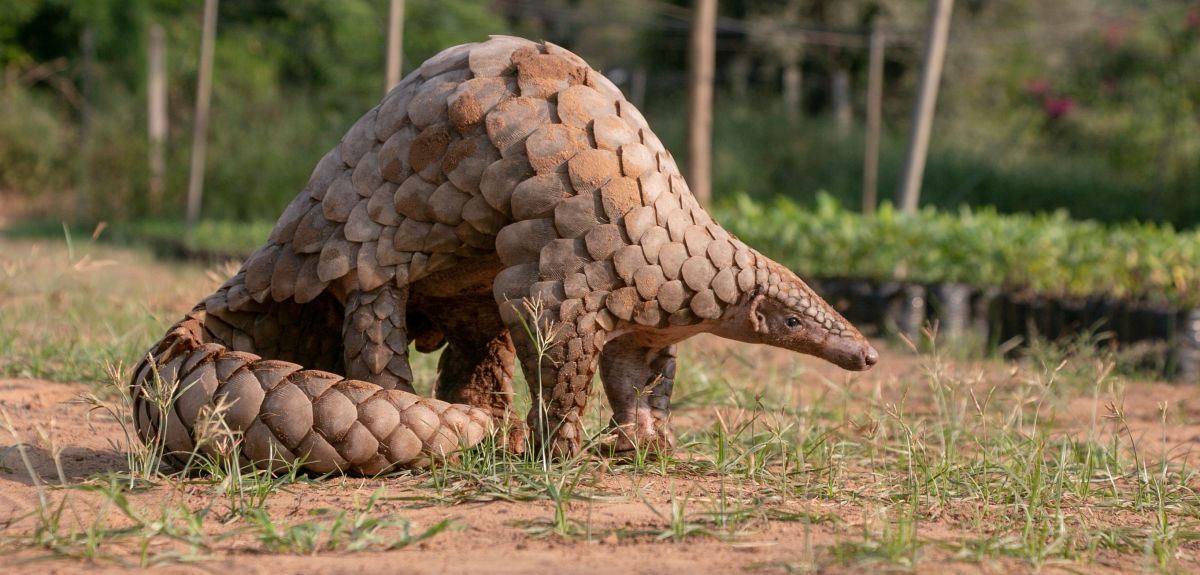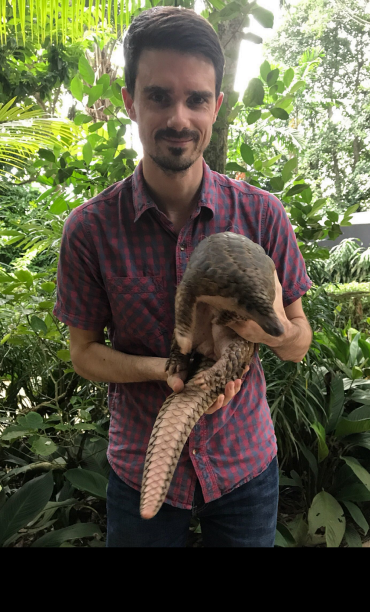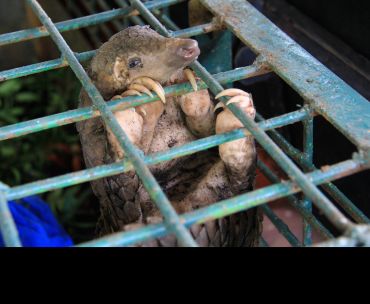
Operation Pangolin launches to save world’s most trafficked wild mammal
Ahead of World Pangolin Day tomorrow, the University of Oxford announces that it is joining a bold initiative to save this iconic animal: Operation Pangolin. With pangolins being the world’s most trafficked wild mammal, tackling this illegal trade is an urgent conservation priority.
 Dr Dan Challender with a Sunda pangolin Manis javanica. Image credit: Dr Dan Challender.
Dr Dan Challender with a Sunda pangolin Manis javanica. Image credit: Dr Dan Challender.Throughout history, pangolins have been sustainably harvested for their scales (used in traditional medicine in parts of Africa and Asia) and for their meat. In recent decades, however, overexploitation has exploded despite national and international legal protections afforded to the species. With a likely large proportion of the illegal trade of their scales and meat going undetected, very little is known about the supply chains through which pangolins are trafficked. Since 2014, the number of trafficked pangolins seized globally has seen an estimated 10-fold increase, with a notable shift of primary source from Asia to West and Central Africa. It is thought that as many as 8.5 million pangolins were removed from the wild in West and Central Africa for the illegal trade during the period 2014 – 2021.
Operation Pangolin will generate much-needed data to inform conservation strategies in Central Africa, including wildlife crime prevention. Throughout the project, the research team will work in partnership with local conservation stakeholders, including indigenous peoples, local communities, and government agencies.
There are four core pillars to the project:
1) monitoring of pangolin populations, including developing and deploying new technologies to do this;
2) understanding the social-ecological systems in which pangolins are harvested, used, and traded in key areas in Central Africa to inform locally-led sustainable conservation solutions;
3) using insights from conservation criminology to prevent the illegal harvesting and trafficking of pangolins;
4) using artificial intelligence and machine learning approaches to unite diverse data streams to prevent wildlife crime involving pangolins, including through predictive approaches.
The project has launched in Cameroon and Gabon, Central Africa, with the support of a $4 million grant from the Paul G. Allen Family Foundation, with plans to expand into Nigeria soon. With further funding, the team hope to expand their efforts into Asia, the only other continent with native pangolin populations.
This project has the potential to transform pangolin conservation, first in key locations in Central Africa, and then extending into parts of Asia. By taking an interdisciplinary approach and using novel technology and artificial intelligence methods, the project will give pangolin populations in these regions the best chance of survival.
Dr Dan Challender, Department of Biology, University of Oxford.
The University of Oxford will focus on the social component of the project. This work will be led by Dr Dan Challender, an interdisciplinary Conservation Scientist based in Oxford University’s Department of Biology and the Oxford Martin School, who has been involved in pangolin research and conservation for 15 years. In 2012, Dr Challender re-formed the International Union for Conservation of Nature (IUCN) Species Survival Commission Pangolin Specialist Group and served as Chair of the group until early 2021.
Dr Challender said: ‘In the last decade pangolin populations in Central Africa have been under increasing pressure from offtake for local use and international trafficking of their scales. This project provides an interdisciplinary response, combining novel social, ecological, and artificial intelligence approaches to reduce and prevent the illegal offtake and trade in pangolins within and from the region.’
The Oxford team will conduct research in and around key protected areas with pangolins in Cameroon to understand the social-ecological systems in which pangolins are harvested, used, and trafficked. This will involve working with key stakeholders to collectively identify the conditions that result in the illegal harvest and trade of pangolins. This information will be used to inform context-specific conservation interventions with local actors (including indigenous peoples and local communities) to ensure that any future use and/or trade of pangolins is legal and not unsustainable.
‘Accurate, actionable data is the foundation of effective conservation efforts,’ said Gabe Miller, director of technology on behalf of the Paul G. Allen Family Foundation. ‘Operation Pangolin will provide a blueprint for how conservationists can turn data into solutions that address important issues like wildlife trafficking and the biodiversity crisis head on.’
 A pangolin rescued from illegal trafficking in Indonesia. Image credit: Shutterstock.
A pangolin rescued from illegal trafficking in Indonesia. Image credit: Shutterstock.You can follow the project’s progress on Twitter #OperationPangolin and on the Operation Pangolin website. You can also get up close to a pangolin for yourself at Oxford University Museum of Natural History.
 Statins do not cause the majority of side effects listed in package leaflets
Statins do not cause the majority of side effects listed in package leaflets